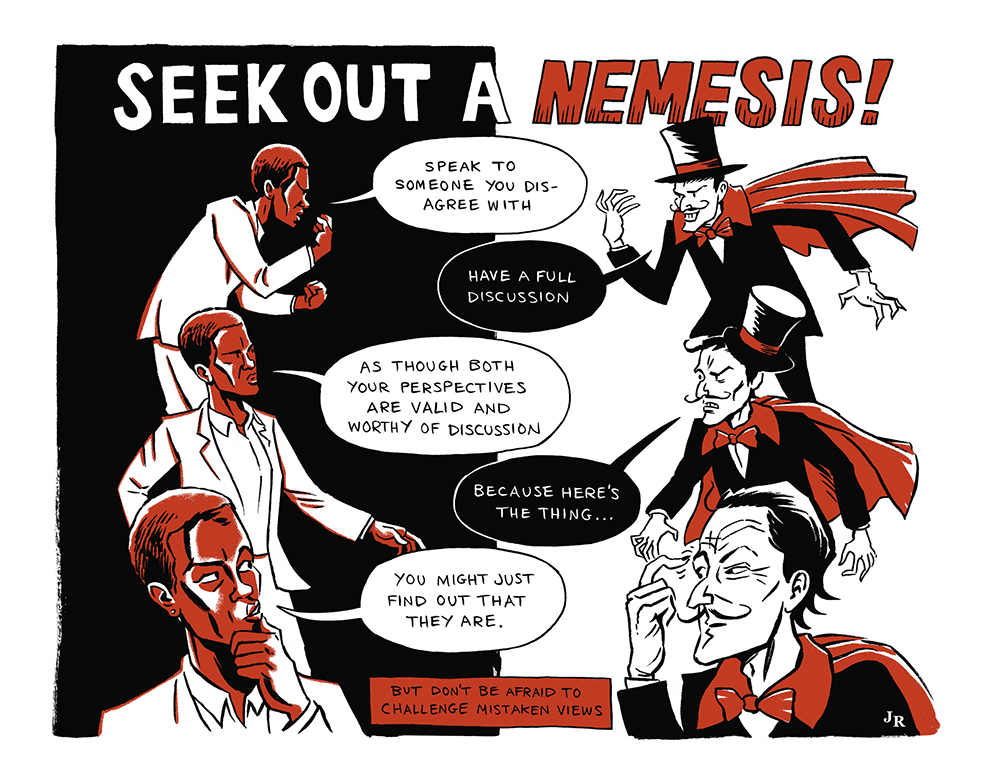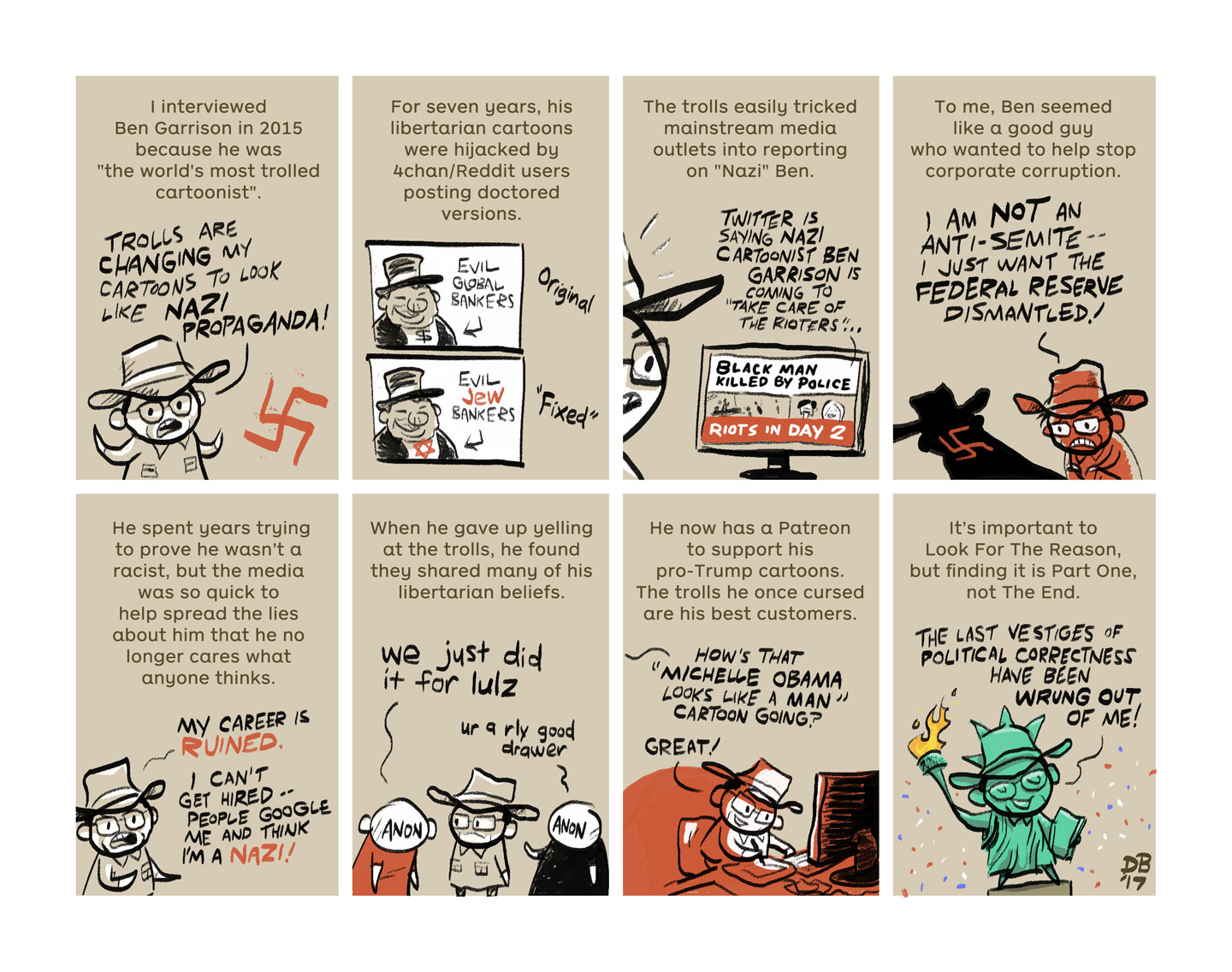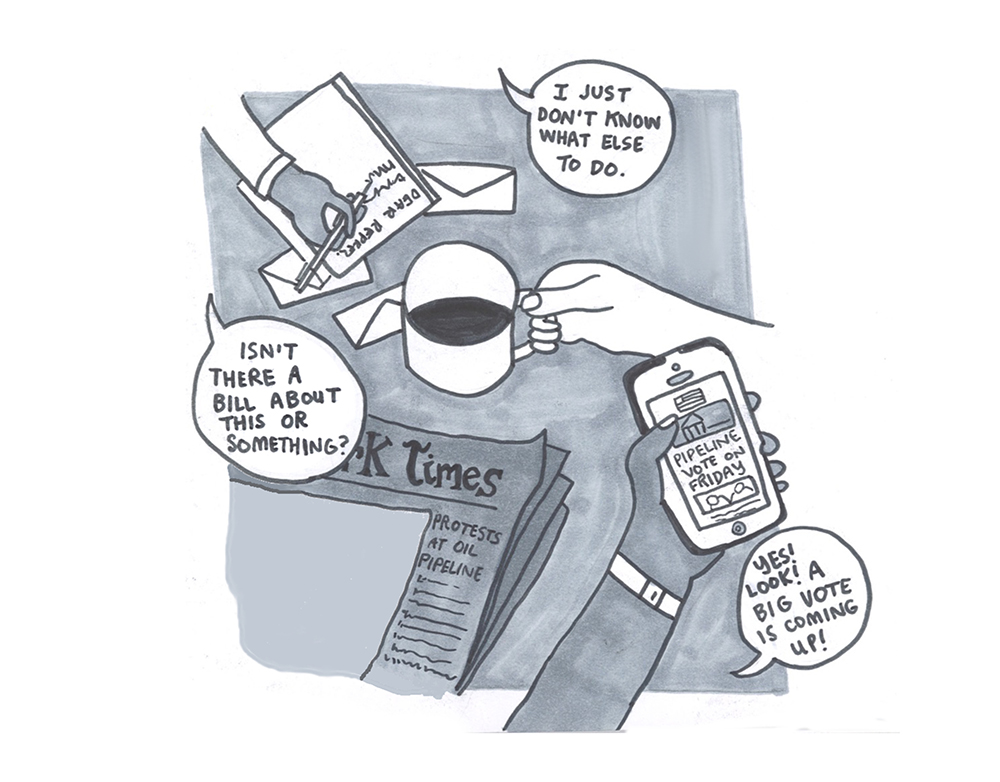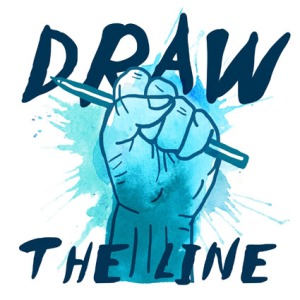Before you start ranting and railing, better know the facts. Apart from anything else, when you know your stuff you’re far more likely to win an argument, and that sure is satisfying.
Here are the positive steps you can take right now to ensure that you know exactly what you’re talking about.
Click any of the images to see them at a larger size.

LISTEN, PAY ATTENTION, & RESPECT
Respect the wishes of other people. If someone, for example, asks you to call them “him” instead of “her”, do it. Trust their judgement about themselves.
Image by Siiri Viljakka

DIG DEEPER
Have conversations that help you understand the opposite points of view.
Knowledge is power, and what’s more, a little understanding makes for much more useful dialogues.
The internet is already full of people throwing insults at those who hold opposing views. Let’s genuinely try and understand where they’re coming from.
Image by Rakel Stammer

REREAD HISTORY
They say history is written by the victors, so a great way to understand the roots of injustice is to read the accounts written by the other side — people who have survived loss and oppression.
Try historian Henry Reynolds’ account of Britain’s near-genocide of indigenous people in Australia, or Howard Zinn’s A People’s History of the United States.
Black History Month can also be a great way for anyone to learn more about the history we don’t hear about in schools.
Image by Graeme McGregor

QUESTION THE NEW NORMS
If the government has slashed support to vital services, there’s a risk that within a generation, we’ll forget that they were ever publicly-funded.
Don’t stop putting pressure on the government to remind it of its responsibilities in whatever areas you consider most important: could be healthcare, libraries, services for the vulnerable, and many, many more.
Image by Ash Pure

RESEARCH YOUR GOOD INTENTIONS
Read up on how people prefer to be supported. Your assumptions may not be quite right.
Image by Richy K. Chandler

SEEK OUT A NEMESIS
Speak to someone you disagree with.
Have a full discussion as though both your perspectives are valid and worthy of discussion. Because here’s the thing… you might just find out that they are.
Image by John Riordan

SPEND WISELY
Read up on the places where you spend your money: do they pay their workers a living wage? Do they support sweatshops or child labour? Do they fund the weapons industry or finance a political party that you disagree with?
Many apps and websites can help you. Shopping with local independent businesses can also help you avoid many of the big, bad brands.
Image by Emmi Bat

QUESTION THE NARRATIVE
It’s a really good, if somewhat cynical, habit to get into: ask yourself what forces or agendas are behind the news.
Every story can be presented in a variety of ways. If you believe that output is being swayed by forces that aren’t entirely neutral, call it out.
Teach your children to do the same (that part’s easy — just shout at your TV or radio every night).
Image by Landis Blair

SLEEP OUT
UK charity Centrepoint encourages a form of fundraising where you’re sponsored to sleep rough, typically in a public space such as a hall, and with others.
OK, so you’re hardly having the authentic homelessness experience, but it does mean that you learn a little about the discomforts of those on the street, while raising the money to help them.
Image by Aki Alaraatikka

QUESTION SOURCES
Don’t believe everything you read. Always check whether that news story has come from a trusted source — especially if you’re planning on sharing it!
Image by Roger Langridge

DIVERSIFY YOUR BOOKCASE
Seek out and read stories, books and comics created marginalised people. Recommend them to others. It’s a win-win: not only are you increasing your knowledge about a different world view, but you’re supporting the authors too.
Image by Amanda Priebe

FOLLOW THE LEADERS
Whatever you believe in, find the group that’s making change and follow them, by signing up for their newsletter, or following them on social media.
Seeing others working for causes we feel strongly about is encouraging, and may help us to do more ourselves.
On a practical level, you’ll never miss their messages, calls to action or fundraising events. You’ll learn about the more in-depth issues behind the cause. And believe it or not, every little ‘like’ or ‘follow’ adds legitimacy to their voice, helping them exert more power on governments.
Image by Mijal Bloch

MONITOR YOUR PARLIAMENT
Parliaments aren’t always the best placed to ensure that their work is being presented impartially, clearly, and accessibly &emdash; that’s why, in many countries, NGOs have taken it upon themselves to do it better.
Modern technology and the internet mean that it’s now relatively easy to set up a website that gives citizens easy access to everything their representatives are doing in Parliament, from what they say to how they vote.
And once those representatives see that they’re being watched in this way, it may have the knock-on effect that they start behaving a little more responsibly!
Image by Paul Peart Smith

OPEN YOUR EARS
Opinions are like… ahem.
Anyway, everyone has one and we’re often eager to express them.
But when you’re speaking to someone with direct personal experience of an issue, like discrimination, take the time to let them speak, understand their experiences and reflect on their viewpoint.
Image by Miia Vistilä.

FOLLOW THE MONEY
You work hard for your money, so the last thing you want is some dodgy corporation using it to fund something you’re opposed to.
Banks can use your money to invest for their own profits, so find out if your bank is putting it into, say, the arms trade, fossil fuels or businesses that use slave labour.
Then close that account and tell other people what you’ve done. And remember to tell your bank: “It’s not me, it’s you”.
In the US, the Sacred Stone Camp, campaigning against the Dakota Access Pipeline, called on people not just to close down their accounts if their bank was funding the pipeline, but to take a picture of themselves doing so and spread it far and wide via social media. They recommended putting the withdrawn funds into a credit union, a non-profit co-operative run for its members.
Image by Guin Thompson

GO SLOW
Fast fashion — the phenomenon of cheap highstreet shops churning out clothes that are only designed to last a season, cost almost nothing, and then end up in landfill — is bad for the environment.
“Clothes are the second largest source of pollution after oil,” according to the US organisation Opposing Views.
It’s very likely also bad for the people who make the clothes. Ask yourself how much the factory workers must be being paid, to be able to offer garments at such low prices. Then research the more ethical options and take your custom there.
Buy fewer items that are high quality and will last longer.
Image by Rica March

POP YOUR BUBBLE
Social media platforms like Twitter and Facebook foster ‘echo chambers’ — networks where everyone shares broadly similar views
After shock elections and referendums, citizens of both the USA and the UK understood the need to seek out opposing viewpoints. In the UK, PositionDial.com provides a subtle and thoughtful way of doing this — and then gives you actions you can take.
Image by Adrien Lee

CHECK YOUR VOCABULARY
Daisy Hernández, author of A Cup of Water Under My Bed, says: “What are you noticing about headlines when the police kill another black teenager? Is the teen described as a kid on his way to college or as a “black male”? I try to raise awareness that we’re trafficking in racial ideology 24-7 online — and that we can change the direction of these conversations every time we hit “comment.”
Same applies across all sectors of society — from gender non-binary to disabled people, and everything in between — but let’s especially listen to what the black community is telling us. Pick your words with care.
Image by Victor Szepessy

LOOK FOR THE REASON
Most human beings don’t just hate for no reason: they have a narrative that explains their beliefs.
Perhaps they see a link between the immigrants coming into their town and the fact that they can’t get a job or a house.
Maybe a strong religious upbringing implanted a fear of alternative sexualities, and a belief that they are doing harm in the world.
Once we begin to understand the reasons for beliefs, we can also understand how to change them. We might even find that there are some valid grievances underlying the rhetoric — tackle those and let’s see what happens.
Image by David Blumenstein

CHECK FACTS
Facts are a better weapon than insults, that’s for sure.
In a ‘post-truth’ world, let’s hold onto the importance of veracity. In the UK you can use FullFact.org, and in the US, Politifact, and there are numerous projects worldwide with the same mission: remaining politically neutral while simply researching and presenting the facts behind news stories.
Image by David Blumenstein

KNOW YOUR REPRESENTATIVES
Websites like TheyWorkForYou.com in the UK, and similar sites set up by NGOs in many other countries, allow you to subscribe to your MP so you get an email every time they speak in Parliament.
Keep careful watch and make sure you contact them if you’re displeased with their activity.
Image by Hannah McCann

KNOW WHAT’S ON THE AGENDA
Subscribe to an online service so that you’ll always know when an important vote is coming up.
Contact your MP or representative and tell them how you want them to vote — even if you know they’ll be toeing the party line. Get your right-thinking friends to do the same.
If enough people make their feelings clear, your representative will convey that upwards to Parliament.
What if there’s no website like this for your country? You can set one up!
Image by Sarah Mirk

As the old saying goes, those who don’t learn from history are destined to repeat it. Think the wars, greed, and prejudices of today are brand new?
Study the past in order to see connections with the present, which can help us understand and stop devastating cycles of conflict and oppression.
Image by Jim Terry
 All artwork on this page is licensed under a Creative Commons Attribution-NonCommercial-ShareAlike 4.0 International License.
All artwork on this page is licensed under a Creative Commons Attribution-NonCommercial-ShareAlike 4.0 International License.
